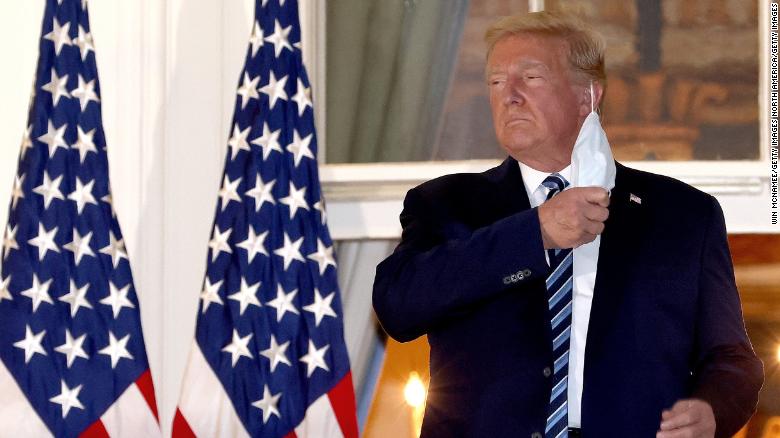President Donald Trump takes off his mask shortly after being released from the Walter Reed National Military Medical Center for COVID-19 treatment. Photo from CNN.
On Oct. 2, it was made public that President Donald Trump, as well as several members of his inner circle, had tested positive for COVID-19.
With the election under a month away, analysts believe this will shake things up before Americans send in their ballots. Those involved in politics at the University of the Rhode Island had their own thoughts on the national situation.
Going into the election, Trump’s diagnosis and the diagnosis of those in his administration made day-to-day operations at the White House a bit more complicated, as those diagnosed with the virus will have to refer to mostly online work.
“Hopefully they follow closer protocols,” URI College Republicans President John Pescatore said. “Now it’s not just them at risk; it is their own citizens so hopefully they consider that.”
URI College Democrats did not respond to requests for comment.
However, whether or not these protocols are actually being followed more closely now is not clear to the American public.
“They told us that they are working remotely,” said political science professor Emily Lynch. “But other than that, they haven’t told us much. We don’t know exactly what is going on at the White House.”
In terms of how the diagnosis affected those who will be voting this fall, studies were done by multiple political scientists to find out how people felt. Vanderbilt University political science professor Mark Hetherington, in a study about how each party treated the virus, found that Republicans took the virus less seriously after Trump’s diagnosis.
This may have been a result of Trump’s response to his battle with the virus, which was the center of attention on social media as he told American citizens not to worry when it comes to COVID-19.
On Oct. 5, Trump tweeted “I will be leaving the great Walter Reed Medical Center today at 6:30 [p.m.]. Feeling really good! Don’t be afraid of [COVID]. Don’t let it dominate your life. We have developed, under the Trump administration, some really great drugs and knowledge. I feel better than 20 years ago!”
Emily Lynch, who joined the URI Political Science Department in the fall of 2019 and has worked in the political science field for Rhode Island Senator Sheldon Whitehouse, commented on Trump’s response.
“His party is less afraid than his enemy party, the Democrats,” Lynch, when speaking on this reaction, said. “What Trump is doing is calculated. Even though it may have been a struggle for him to get through it, he is going to underscore the virus to appeal to his party who is not as worried about it.”
In terms of how this will swing the vote, Pescatore does not feel like it will drastically change the way people vote in November, claiming that people’s opinions on the virus are already formed.
“Obviously getting the virus won’t be a direct positive for his campaign, but I feel like his followers were not worried about the virus to begin with,” Pescatore said. “It probably won’t change the outcome of the election for Trump too negatively.”
Based on Hetherington’s research, this rings true as well. Attitudes and behaviors, according to his findings, have stayed pretty consistent in terms of approval rate for the president.
However, Lynch said the president’s diagnosis has had a substantial effect on the public’s focus toward the virus.
“According to a study by Tom Pipinsky, professor of government studies at Cornell, more people in the general population tend to believe face masks are important,” said Lynch.
That percentage of the population increased to 59 percent from the original 56 percent after Trump’s diagnosis.
In terms of how the two major parties feel about the virus afterward, Lynch said Democrats focus more on mask wearing while Republicans think more about travel and not letting those from out of the country in.
“The good news is that both parties are focused on making sure the election happens,” Lynch said.





